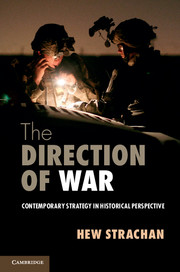Book contents
- Frontmatter
- Contents
- Acknowledgements
- Introduction
- 1 War and strategy at the beginning of the twenty-first century
- 2 The meaning of strategy: historical perspectives
- 3 The case for Clausewitz: reading On war today
- 4 Making strategy work: civil–military relations in Britain and the United States
- 5 Strategy and the limitation of war
- 6 European armies and limited war
- 7 The limitations of strategic culture:the case of the British way in warfare
- 8 Maritime strategy and national policy
- 9 Technology and strategy
- 10 War is war: imperial legacies and current conflicts
- 11 Strategy and the operational level of war
- 12 Strategy and contingency
- 13 Strategy: change and continuity
- Notes
- Index
12 - Strategy and contingency
Published online by Cambridge University Press: 05 June 2014
- Frontmatter
- Contents
- Acknowledgements
- Introduction
- 1 War and strategy at the beginning of the twenty-first century
- 2 The meaning of strategy: historical perspectives
- 3 The case for Clausewitz: reading On war today
- 4 Making strategy work: civil–military relations in Britain and the United States
- 5 Strategy and the limitation of war
- 6 European armies and limited war
- 7 The limitations of strategic culture:the case of the British way in warfare
- 8 Maritime strategy and national policy
- 9 Technology and strategy
- 10 War is war: imperial legacies and current conflicts
- 11 Strategy and the operational level of war
- 12 Strategy and contingency
- 13 Strategy: change and continuity
- Notes
- Index
Summary
Strategy is oriented towards the future. It is a declaration of intent, and an indication of the possible means required to fulfil that intent. But once strategy moves beyond the near term, it struggles to define what exactly it intends to do. Part of the problem is generated by the conceptual shift from what current NATO jargon calls ‘military strategy’ to what Americans increasingly call ‘grand strategy’ (and which other states, as the USA once did, have come to call ‘national strategy’). The operational plans of military strategy look to the near term, and work with specific situations. Grand strategy, on the other hand, can entertain ambitions and goals which are more visionary and aspirational than pragmatic and immediate. It is as much a way of thinking as a way of doing. By using the same word, strategy, in both sets of circumstances, we create an expectation, each of the other, which neither can properly fulfil. The shift from ‘military strategy’ to ‘grand strategy’ is particularly fraught: it suggests that the latter, like the former, is underpinned by an actionable plan. If strategy is a matter of combining means, ways and ends, what are the ends towards which a state, nation or group is aiming when it cannot be precise about the future context within which its means and ways are being applied? Answering that question is the central conundrum of grand strategy, and being able to do so sensibly is correspondingly more difficult the more extended the definition of the future which grand strategy uses.
- Type
- Chapter
- Information
- The Direction of WarContemporary Strategy in Historical Perspective, pp. 235 - 252Publisher: Cambridge University PressPrint publication year: 2013
- 2
- Cited by

